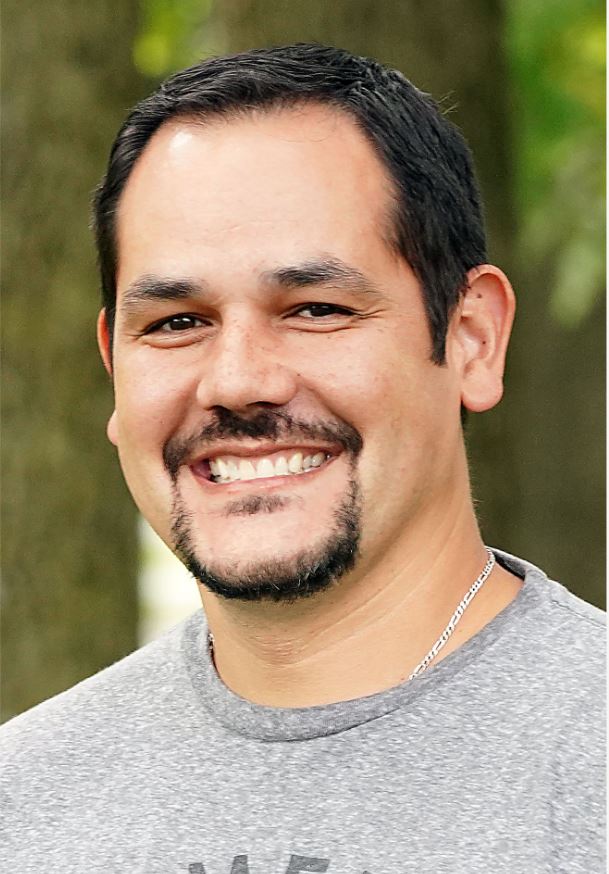Chris Ardohain: Purdue’s Esri student of the year
Lieutenant Colonel Christopher Ardohain is not your average Purdue graduate student. There’s the “Lieutenant Colonel” part, to start: Ardohain graduated from West Point in 2005 and is still on active duty in the United States army. His life experiences before coming to Purdue have included living in six different states over the course of his military career, two deployments in Iraq and one in Afghanistan, marriage to Kate, a former army human resources officer, and becoming the father of two sons.
 Now, Ardohain, PhD student with a specialization in Geographical Information Systems (GIS) in Purdue’s Department of Forestry and Natural Resources and conducting research in the Institute for Digital Forestry, has another feather for his impressive cap: the Esri Student of the Year award.
Now, Ardohain, PhD student with a specialization in Geographical Information Systems (GIS) in Purdue’s Department of Forestry and Natural Resources and conducting research in the Institute for Digital Forestry, has another feather for his impressive cap: the Esri Student of the Year award.
Esri is a California-based multinational software company whose ArcGIS software for creating, analyzing, and visualizing spatial data and maps is ubiquitous in the GIS field. Its Student of the Year award “acknowledges and encourages university students to innovate using the ArcGIS Platform.” Recipients receive a $500 cash award, and are automatically entered for the chance to win Esri International EIP Student of the Year, which means an invitation to Esri’s annual conference in San Diego.
“It’s quite a prestigious award, because we are only able to pick one student every year,” says Nicole Kong, a professor of GIS and Associate Dean for Research at Purdue Libraries who nominated Ardohain. “Every year we have so many excellent students at Purdue doing research in GIS. There is always some work I can’t wait to share with my colleagues – Chris’s project is one of those I couldn’t wait to share with everyone.”
Ardohain first became aware of GIS at West Point. “I found out there was a whole field around making maps, I thought that that was a pretty cool idea,” he says. “I really enjoy the fact that somebody who works in the GIS field is not constrained to any particular discipline.”
More than a decade after graduating from West Point, following various army assignments, Ardohain earned a master’s degree in operations research with a data science track at the Naval Postgraduate School in Monterey, California. His Purdue PhD work is in digital forestry, focusing on the relationship between training data and deep learning performance.
“One of the big problems in the world of machine learning is the availability of training data,” he says. “Especially when it comes to remote-sensing data. When we’re looking at the ground from space, there’s a whole variety of different scales, platforms and sensors, each of which may need unique training data.”
Ardohain’s work bridges the gap between expensive, high-resolution data and cost-efficient but low-resolution data. If more of the low-resolution data could be used, that would help make digital forestry tools more accessible in more places. But the question is, how much of that data is actually useful? That’s a question he’s hoping to help solve.
Nicole Kong brings up Purdue’s ambitious multi-year digital forestry program, which hopes to use AI to map every tree on earth. “I think Chris’s work is a very solid stepstone towards that goal,” she says.
A desire to focus on forestry applications for GIS led Ardohain to choose Purdue for his doctoral studies. “I was looking for a program where I could exercise my expertise with deep learning and remote sensing with an environment slant,” he says.
He was also, he admits, drawn by the Midwestern location, the cooler weather an enticement after living most recently in Florida.
“My wife’s from Utah, and I promised her at least some snow!” he says.
Ardohain has found Purdue a “fantastic” and “deeply supportive” environment. “People are great,” he says. “Everybody is committed and passionate about the things they’re working on, and that’s a great thing to see.”
Ardohain’s PhD is being completed through a special army program that will allow him to go directly to teach at West Point following graduation in 2025.
“I’m looking forward to it for sure,” he says. “It’s the culmination of a lot of the work I’ve put in over the 19 years I’ve been in the army. I’m very excited, but I’m also a little scared too. It’s a brand-new thing I’ve never done before, but I like the idea of teaching and sharing knowledge.”





